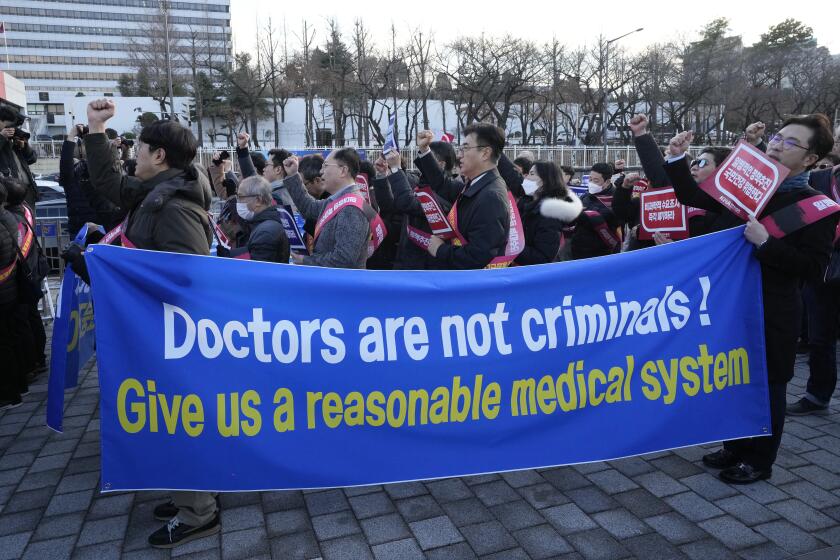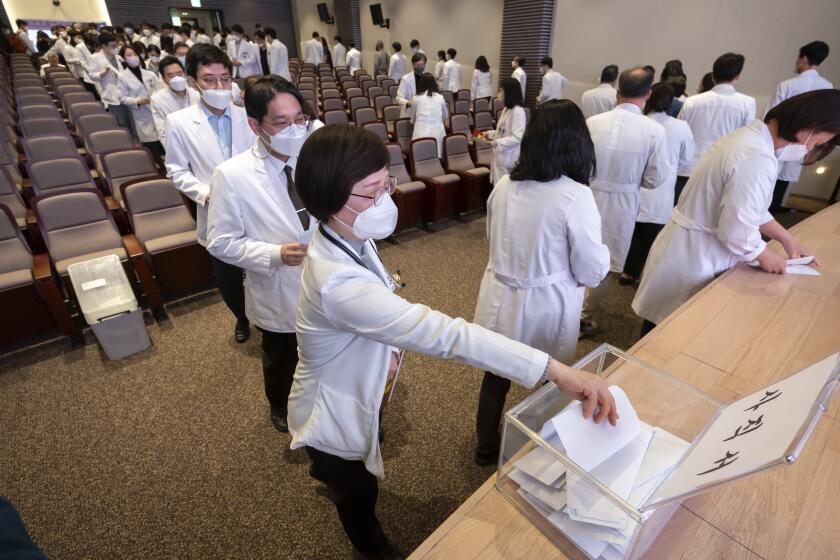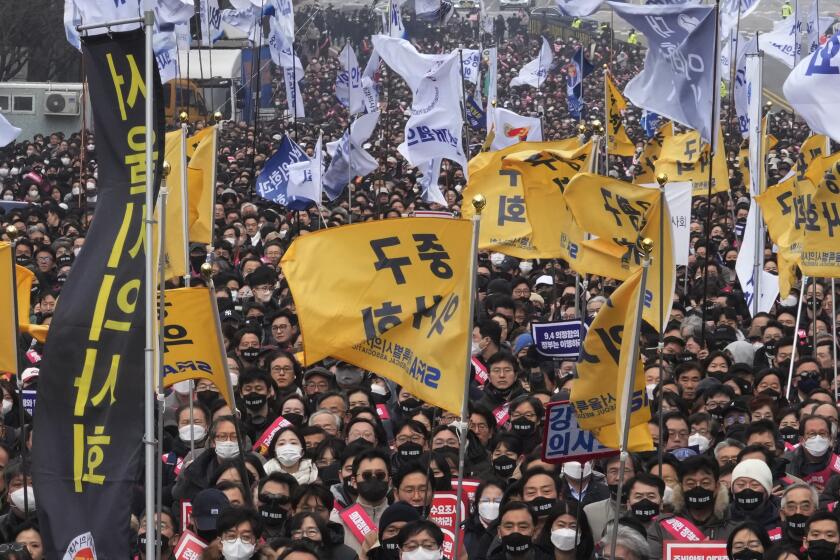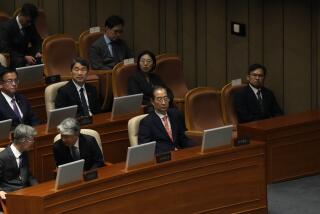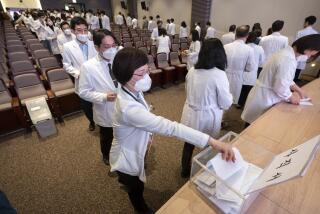South Korea’s president meets leader of doctors’ strike in bid to end their walkouts
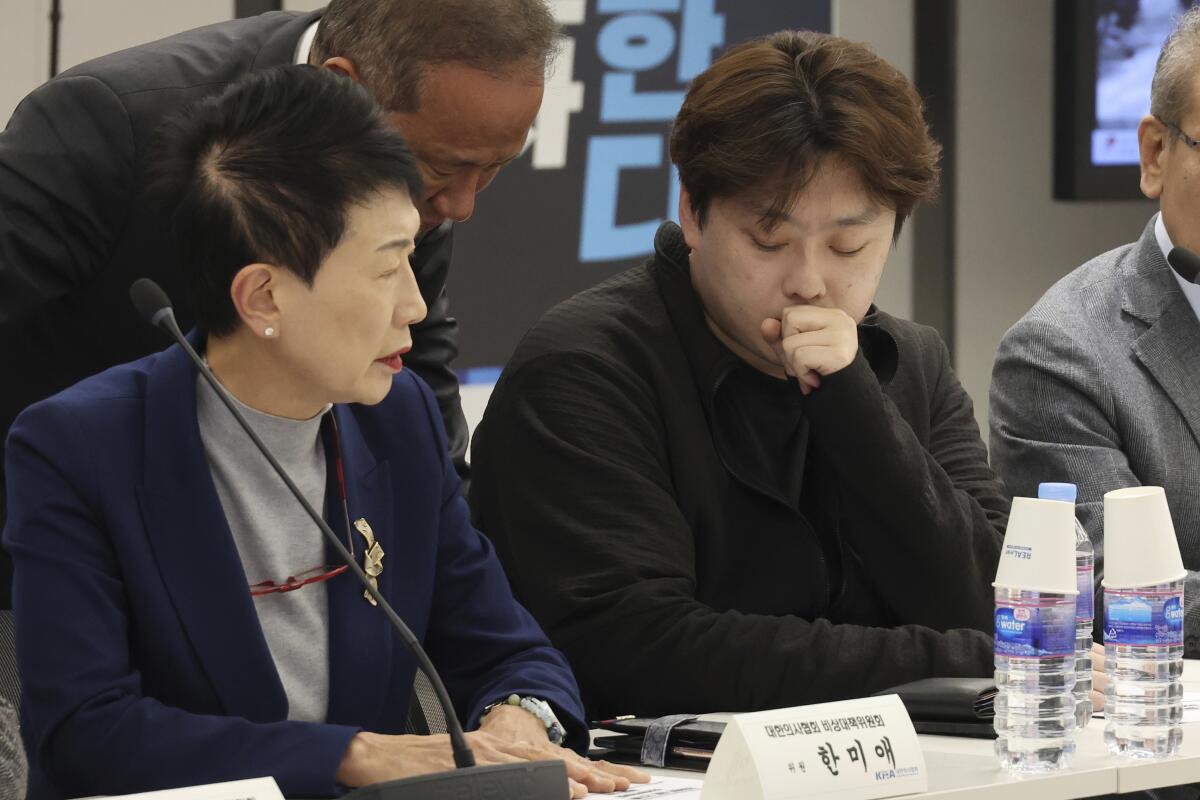
- Share via
SEOUL — South Korean President Yoon Suk Yeol met the leader of a strike by thousands of junior doctors on Thursday and said that the government is open to talks about its contentious push to sharply increase medical school admissions.
The meeting was the first of its kind since more than 90% of the country’s 13,000 trainee doctors walked off the job in February, disrupting hospital operations. But there was still no immediate report of a breakthrough after the meeting.
During a lengthy televised public address Monday, Yoon defended his plan to recruit 2,000 more medical students each year, from the current cap of 3,058. But he said his government remains open to talks if doctors come up with a unified proposal that gives logical reasons for their calls for a much smaller hike of the enrollment quota.
Junior doctors in South Korea are striking to protest the government recruiting more medical students to cope with the country’s fast-aging population.
On Thursday, Yoon met Park Dan, head of an emergency committee for the Korean Intern Resident Assn., for more than two hours, during which “the president said he would respect the position of trainee doctors in the event of talks with the medical circle on medical reform issues, including an increase of doctors,” according to Yoon’s office.
It didn’t say whether the government plans any immediate talks with the doctors or whether Yoon’s comments would mean he’s willing to lower the size of his proposed medical school admission increase. The strikers have earlier demanded the government withdraw the 2,000-student admission increase plan.
In a brief Facebook message posted after the meeting, Park wrote that “there is no future for the medical service of the Republic of Korea” without elaborating. Repeated calls to Park went unanswered. Another striker, Ryu Ok Hada, earlier accused Park of having unilaterally met with Yoon without approval from fellow strikers.
The action isn’t likely to cause an immediate worsening of hospital operations because the doctors have said they will continue to work.
During the meeting, Yoon also listened to Park’s views on problems facing South Korea’s medical system, and the two exchanged opinions on how to improve working conditions for interns and medical residents, Yoon’s office said in a statement.
Yoon has said the 2,000-student enrollment increase is the minimum necessary, given that South Korea has one of the world’s most rapidly aging populations and its doctor-to-patient ratio is the lowest among advanced economies.
But many doctors have argued that universities can’t deal with such an abrupt increase in the number of students, and that it would ultimately undermine the quality of the country’s medical services. But critics say doctors, one of the best-paid professions in South Korea, simply worry that the supply of more doctors would result in lower future incomes.
Public surveys show that a majority of ordinary South Koreans support Yoon’s plan. But observers say ordinary people are increasingly fed up with the protracted confrontation between the government and doctors, as the doctors’ strikes have triggered hundreds of canceled surgeries and other medical treatments at hospitals.
Thousands of striking junior doctors in South Korea are facing proceedings to suspend their medical licenses.
Yoon has faced calls from many, including some in his own conservative ruling party, to make concessions as the party’s candidates face an uphill battle against their liberal rivals ahead of the April 10 parliamentary elections.
The striking doctors face license suspensions because they missed a government-set deadline to return to work by the end of February. Government officials have repeatedly suggested they could soften punitive steps if strikers return to their hospitals voluntarily.
The striking doctors represent a fraction of the total doctors in South Korea — estimated at between 115,000 and 140,000. But in some major hospitals, they account for about 30% to 40% of doctors, assisting qualified doctors and department chiefs during surgeries and other treatments while training.
Kim writes for the Associated Press.
More to Read
Sign up for Essential California
The most important California stories and recommendations in your inbox every morning.
You may occasionally receive promotional content from the Los Angeles Times.
